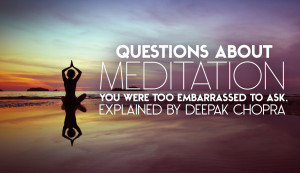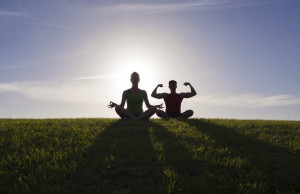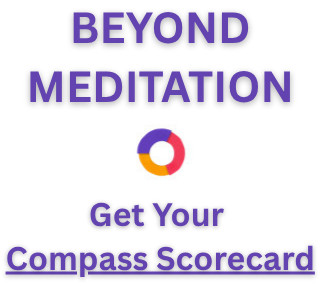… Explained By Deepak Chopra
For everyone who’s thought about meditation but never actually gotten around to trying it.

What is meditation?
Deepak Chopra: Meditation is the progressive quieting of our mind, until we reach the source of thought, which in wisdom traditions are the realm of our soul and spirit. In this domain of awareness there is infinite creativity, synchronicity, the power of intention, and freedom from limitations.
How does it differ from, say, yoga or just resting with your eyes shut?
DC: Most Westerner’s conception of yoga is physical postures or asanas, which is only one of the traditional eight aspects of yoga. Yoga means union of the individual mind with universal mind, so meditation is considered the essence of yoga. The transformation of the mind and body during meditation is significantly more profound than simply resting with your eyes closed. Below is a brief sketch of the eight limbs of yoga:
1. Integrity: These are behaviors and attitudes that enhance our spiritual evolution and connection to life, truthfulness, nonviolence, self-sufficiency, gratitude, equanimity, etc.
2. Observances and self-discipline: These are behaviors that encourage spiritual habits like contentment, perseverance, surrender, self-inquiry, etc.
3. Physical postures (asana): This is the common interpretation of yoga and what is taught in yoga studios and by most yoga teachers. It is mind-body integration.
4. Breathing techniques (pranayama): There are over 100 breathing techniques that create different effects on our body such as energizing, cooling, calming, effecting the cardiovascular system and brain waves, etc.
5. Withdrawal of the senses and looking within the body (pratyahara): These also include various techniques called kriyas and bandhas, which allow us to have control over the internal organs of our body.
6. Focused awareness and attention (dharana).
7. Uninterrupted flow of unfocused attention (dhyana).
8. Transcendence (samadhi) is best understood as going beyond space and time and finding our identity as the ground state or source of the universe. It is the state of meditation where the self merges with the object of meditation and experiences the unity at the basis of all life.
What would be an easy way for someone try meditation? Can anyone just sit down and close their eyes and do it or do you need special training?
DC: Anyone can do simple forms of meditation. One can sit comfortably with your eyes closed, put your attention in your heart, ask yourself the following four questions:
1. Who am I?
2. What do I want?
3. What is my purpose?
4. What am I grateful for?
You don’t need to seek the answers, but just be aware of any sensations, thoughts, images that come to you. Effortlessly observe your breath for 10 minutes and you will come out refreshed. In addition you will start to experience synchronicity and coincidences in alignment with your life purposes and what you want.
What are the overall effects of meditation?
DC: Meditation has physiological effects of lowering blood pressure, slowing down heart rate, strengthening the immune systems, and even changing the cellular biology of aging. Stress hormones are decreased and hormones that modulate immune function are increased. In addition, meditation helps with better sleep and enhances intuition, creativity, conscious choice-making, and the experience of synchronicity. The ultimate goal of meditation goes beyond these positive physical and mental effects. The goal is to fully awaken the higher self, which is connected to the source of that all that exists. This aspect of meditation is referred to as the journey into enlightenment. We no longer fear death and it reveals our true nature beyond the separate self as immortal, infinite, and free.
Will meditation work on anyone?
DC: Meditation will work on anyone who has a functioning human nervous system. All you need is the intelligence to follow simple instructions. Even children as young as 4 and 5 have been taught to meditate successfully.
Is there a way to combine exercise and meditation?
DC: Exercise is a very good thing to alternate with meditation. Exercise helps to stabilize the effects of meditation as well as create a healthier, stronger body, which allows the mind to go more deep during meditation. But the two activities need their separate space, so allow about 10–15 minutes between doing one after the other.
How about someone with stress and anxiety who can’t even fathom having a “clear mind”?
DC: Such a person needs meditation more than anyone else because they are headed for a crisis. If stress and anxiety are so great that you can’t even imagine a calm clear mind, that indicates you are reaching your coping limits, and need to begin something like meditation just for the stress reduction benefits.

How often do you have to meditate in order to reap benefits?
DC: The ideal is twice a day but even once a day is a great start.
And for how long?
DC: When you are starting out with meditation, begin with 15–20 minutes each sitting. As you continue, you may gradually increase your time, if it is comfortable and you find it easy to integrate the effects of meditation into your daily life.
Are there different levels of meditation?
DC: Yes there are. There are general levels from beginner, to master, to enlightened being, with innumerable levels in between.
What do you say to someone who claims to have tried meditation but it “didn’t work” because they “had too much to think about”?
DC: They should persist as they need it most. The other choice is to settle for a stressed life, crisis, and illness in the future.
What about those that say they could be spending their time getting other things done?
DC: Meditation allows one to be more efficient and accomplish more by doing less. For those who are not willing to embrace this idea, hard work, exacting plans, and driving ambitions may help them accomplish their goals, but at a high cost that includes stress, illness, and addictive behavior.
Does my posture effect meditation?
DC: To a small extent. It is better not to lie down as that increases the tendency to fall sleep. Otherwise a comfortable upright sitting posture is good enough. In the case of people in hospitals, meditation can be taught sitting up in bed.
Is there an ideal time of day to meditate?
DC: The best time to meditate is early in the morning after getting up and before sunset.
Is there a way to still be productive while meditating?
DC: That question itself suggests a stressful mind. Meditation provides a basis for productive activity that activity itself cannot provide, the same way sleep improves our productivity, even though you can’t be productive while you sleep.

Do I need to turn off my TV and other electronics in order for it to work?
DC: Meditation works better when there is silence in your surroundings. If the mind is repeatedly drawn out to deal with environmental stimuli, then it has fewer opportunities to dive down deep into the silence of being.
Can you meditate to your favorite pop song or music video or is that too distracting/not the point?
DC: What you are suggesting might be relaxing or enjoyable, but it would not be considered meditation, because there is no procedure there for experiencing your true self.
Can you meditate with others or will they distract and/or take away from benefits?
DC: Meditating with others is good, because collective meditation enhances the effect both for the individual, as well as the positive influence it creates in the environment.
Are there any negative aspects of meditation that people should be wary of?
DC: Meditation itself does not have negative effects, but if someone has a seizure disorder, or severe mental illness, they should consult their doctor before practicing meditation.
What is mindfulness, and why is everyone talking about it lately?
DC: Mindfulness means paying full attention to what you are doing in the present moment. Mindfulness meditation has become popular, as it is easy to do. Observing sensations in your body has profound and beneficial effect on our physiology.
If this were The Idiot’s Guide to Meditation, what three things would you want us to take away from this?
1. Relax.
2. Breathe.
3. Push the pause button before reacting.
Will meditation change my life?
DC: Yes, meditation will change your life for the better, enhance your physical health, improve your sleep, and help you achieve your goals, both material and spiritual.

Source: Whitney Jefferson, Buzzfeed



